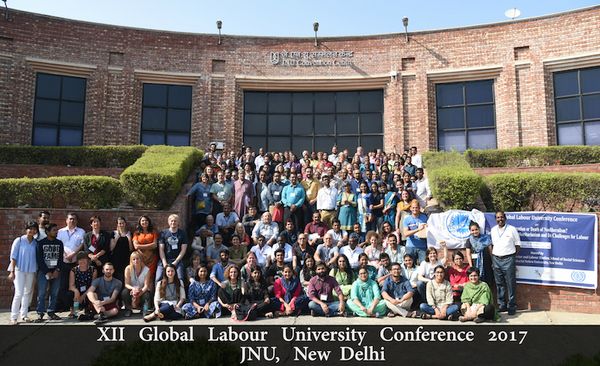GLU Conference
XII Global Labour University Conference,
4 - 6 Oct. 2017, New Delhi, India
Reincarnation or Death of Neoliberalism?
The rise of market authoritarianism and its challenges for labour
Venue: Convention Center, Jawaharlal Nehru University, New Delhi
For three decades the rise of globalization commanded wide support as being necessary, desirable and, in any case, inevitable. Government after government, including those led by social democratic or socialist parties, accepted the imperatives of free capital markets, free trade, global production networks and flexible labour markets. The financial crises of 2008 shook the intellectual dominance, but not the institutional architecture of neoliberalism. Indeed, a new wave of structural adjustment and austerity was imposed on countries that had lost competitiveness. On the other hand, critical voices in the political mainstream became more frequent. Within the IMF, OECD and World Bank inequality as well as volatile and under-regulated financial markets were admitted to be problematic. Piketty?s ?Capital in the Twenty- First Century? became a bestseller. The confidence in the rationality of financial markets was shattered.
However, the apparent failures of the current globalization regime are most successfully exploited by nationalistic-authoritarian movements promising greater prosperity and fairness within nations by taking a more aggressive stance towards others. Movements mobilizing against ?unfair? competition from other countries or foreign migrants command considerable working class support. Wide ranging, radical and often incomprehensive and demagogic policies deliver a unifying and mobilizing message by taking recourse to traditional values in a rather aggressive and exclusive fashion. Affirmative action for disadvantaged social groups or castes, gender equality, ethnic or religious minorities, government regulation, political correctness, migrants, or cultural liberalism in general are cultivated as favourite hate objectives of the disgruntled and successfully blended with promises to make the nation great again.
Today, it is unclear how the interests of global capital and the rise of authoritarian but popular leaders might reconcile and what that will imply for workers? rights, equity, liberal democracy, cultural diversity and respect for minorities. Will it by and large result in usual neoliberalism complimented with a different rhetoric and some symbolic but marginal policy changes, or are there more far-reaching systemic changes in the making? Assuming that whatever happens will be just another reincarnation of ?old neo-liberalism? carries the risk to underestimate the implications the emerging new configurations.
It is an open question what such a new configuration might imply for labour. While some of the more interventionist economic ideas advocated by the protagonists of economic nationalism seem to be similar to long standing criticism of the current globalization regime, the authoritarian ?anti-globalization? agenda is not accompanied with policies trying to make national societies fairer and more inclusive, or addressing the environmental challenges of globalization. And the agenda has little sympathy for workers? rights and organized labour. Rather, the agenda seems to aim at a new national project combining close ties between business and the state with a mobilizing set of excluding values to build an intolerant majority. This should be particularly seen in terms of the threats against migrant labour which face undue hardships within nations.
Labour faces the enormous challenge of simultaneously responding to the current globalization regime marked by growing inequality, continuing environmental degradation, global capital mobility, exploitative global supply chains, persistent high levels of informal employment, and growing precariousness through rapid digitalization. At the same time, labour must now respond to the rise of a national-authoritarian, anti-globalization wave. The conference will discuss these challenges under a number of sub-themes:
1. Socially and economically just alternatives
2. Global supply chains and implications for labour
3. Changing technology and the world of work
4. Building Movements against Neoliberalism and Neo-nationalism
The conference is hosted by the Jawaharlal Nehru University (JNU), New Delhi. It aims to promote debate between academic scholars, trade unionists and civil society activists and leaders.
For more information please contact the conference coordinator at jnugluconf2017(at)@gmail.com
Conference Papers
Maps from International Airport of Delhi to Guesthouses
(all Guesthouses are in the vicinity of JNU)
Student volunteers will guide participants from the guesthouses to the conference venue
Hotels
List of hotels close to the conference venue

